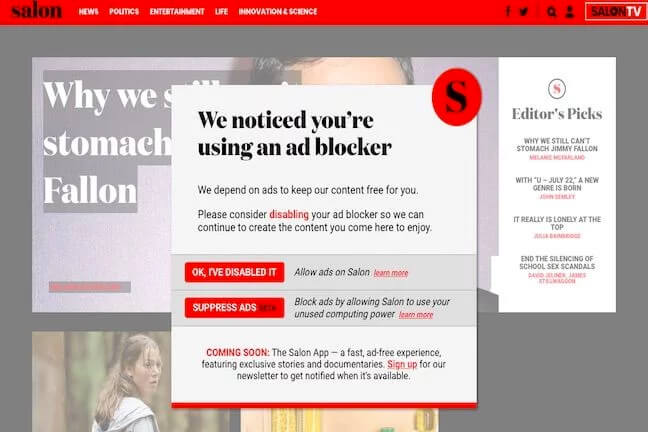
Mining cryptocurrencies may be a new revenue stream for website owners. Source: Pixabay
Mine for crypto while reading the news
A NEWS site based in the US has taken a step which may become increasingly familiar as websites struggle to find routes to successful monetization.
If visitors to salon.com are running ad-blockers on their browsers, they are asked to contribute to the site’s upkeep by mining a cryptocurrency (Monero) for its owners.
When the site detects the presence of ad-blocking code, a dialog box announces:
“We’ve noticed you’re using an ad blocker. We depend on ads to keep our content free for you. Please consider disabling your ad blocker so we can continue to create the content you came here to enjoy.”
Two options are available (in addition to navigating away): disable the ad-blocking software and continue, or, “Block ads by allowing Salon to use your unused computing power.”

Visitors with ad-blocking software running are presented with options. Source: Screenshot / Salon.com
Regarding the use of “unused computing power” to which the site refers, the ‘About’ section of salon.com states:
“We intend to use a percentage of your spare processing power to contribute to the advancement of technological discovery, evolution and innovation.
The site’s text then goes on to say that initially, cryptocurrency mining will take place “to recoup lost ad revenue,” but in time, “any learnings from this” will help support the growth of blockchain technology.
“Mining uses more of your resources which means your computer works a bit harder and uses more electricity than if you were just passively browsing the site with ads.”
The phrases “a bit harder” and “more electricity” are not quantified, and the site places a cookie which lasts 24 hours, so any revisits within that period sans ad-blocker will restart the mining activities.
In a series of elementary experiments not intended to be defining or irrefutable, browser processes ramped up to a fairly constant 30 percent use of total CPU power during a mining/browsing session, on a four-CPU office machine.
Salon explains:
“Think of it like borrowing your calculator for a few minutes to figure out the answer to math problems, then giving it back when you leave the site. We automatically detect your current processing usage and assign a portion of what you are not using to this process. Should you begin a process that requires more of your computer’s resources, we automatically reduce the amount we are using for calculations.”
The technology behind this option is relatively simple and the code required is open-source. The site code uses a Monero pool mining site to add the visitor’s computing power to mining operations. Salon.com’s owner’s Monero wallet will be credited by any successful mining operations.
Anyone browsing the web on most modern browsers will be able to install a JavaScript blocker, which in many cases not only will block on-page advertising and pop-ups but will also disable mining code deployed in this manner.
Interesting: @AP Uses these #AI #Tools To Boost Content And #Video Volume https://t.co/6I0joiS6EU #future of #journalism
— Uli Hesse (@UliHesse) February 22, 2018
Alternatively, services are available which can almost entirely prevent that and similar problems for concerned Internet users, including a range of VPNs and analogous tunnelling applications, plus ad-free DNS servers which stop resolution of domain names known to serve commercial content.
There are several business models which hope to solve the problems of monetizing websites, especially in industries like news publishing which is being severely disrupted by technology.
Subscriptions, paywalls, paid-for content, limited content and on-screen advertising are all options, and this array is joined by having visitors become part-time Monero miners.
READ MORE
- The criticality of endpoint management in cybersecurity and operations
- Ethical AI: The renewed importance of safeguarding data and customer privacy in Generative AI applications
- How Japan balances AI-driven opportunities with cybersecurity needs
- Deploying SASE: Benchmarking your approach
- Insurance everywhere all at once: the digital transformation of the APAC insurance industry


